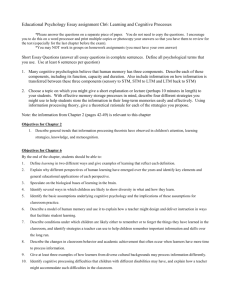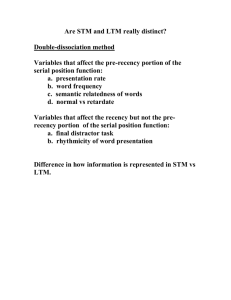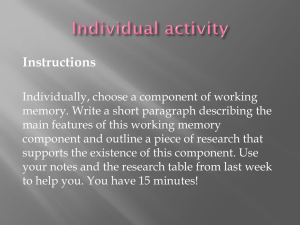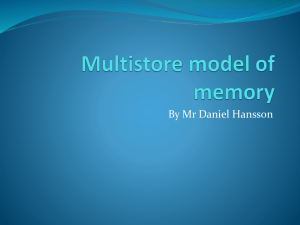H Psych Overview Irene Lawrie
advertisement
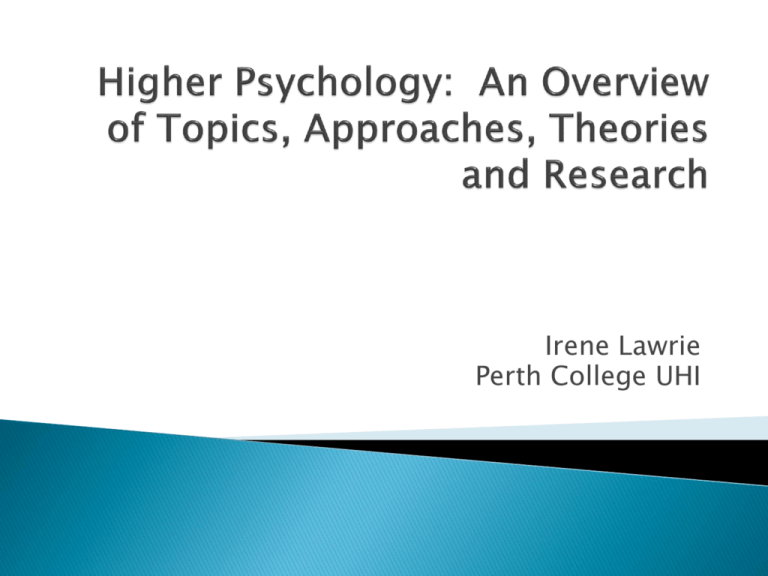
Irene Lawrie Perth College UHI Greater emphasis on the approaches. Fundamental to psychology. They are the different explanations of why people behave the way they do. Understanding of psychology is gained though the application of approaches to topics. Relevant research is identified to illustrate the application of approaches to topics. A critique of the research is required in order to evaluate not just the research itself but evaluate how the approach explains the topic. Results in better understanding of how psychology relates to the topic. Demands and develops analytical and evaluative skills. What do we do with information? What use is this information? Why are we learning this? It has relevance to real life! We can apply it! Topic Application Evaluation Approach Research Biological Approach Cognitive Approach Restoration Theory Information Consolidation theory Research Research Sassin et al. (1969) suggests growth hormone(GH) is controlled by slow wave sleep(SWS). Van Cauter and Platt (1996) GH released correlates with SWS. Kreugar et al. (1985) identified that lack of SWS reduces functioning of immune system. Siegel & Rogawaski (1988) REM sleep halts neurotransmitter release allowing neurons to regain sensitivity allowing the body to function effectively. Savard et al. (2003) insomnia positively correlates with fewer immune cells. Walker et al. (2005) sleep post-training improved speed and accuracy in a finger tapping exercise. Huber et al. (2004) SWS increased by up to 25% after some forms of learning. Zammit et al (1999) Insomnia sufferers demonstrated impairment in cognitive tasks involving concentration, memory and problem solving. Arendt et al (2001) showed that keeping people awake for a few hours leads to driving impairments comparable to those who with modest levels of alcohol. Healthcare: Sleep important for boosting immunity, recovering from illness and surgery. Child development and parenting skills: Sleep required for babies to grow and develop. Young children require Slow Wave Sleep(SWS) for the release of growth hormone. Sporting Domain: Athletes require adequate sleep to recover from strenuous training and for growth and repair. Youth support: Adolescents require understanding as they endure Circadian Rhythm disruptions due to hormone upheaval resulting in them sleeping later. Education, Education Education! Job performance. Memory recovery and dementia. Cognitive Approach Theory : Schema and the Reconstruction of Memory (Bartlett,1932) Research: Serial reproduction and The War of the Ghosts (Hunter, 1964) Allport & Postman (1947) Loftus (1974) Application: Eye Witness Testimony Cognitive Approach: Models of memory: multi-store model (Atkinson and Shiffrin, 1968). Research: Research which supports the different dynamics of the short term(STM) and long term memory (LTM) in terms of encoding, capacity and duration. Application: Education. Rehearsal essential for the transference of information from STM to LTM Working Memory Model (Baddeley and Hitch, 1974). Explains the different cognitive functions of the STM in terms of the central executive, the phonological loop and the visuospatial sketchpad. Research: Dual task method (Baddeley et al., 1975). Application: More relevant to everyday tasks. Biological Approach Theory: Multi-store model of memory (Atkinson and Shiffrin, 1968). Research: Milner et al. (1968) Research which supports the idea of different biological locations for the STM and LTM. The STM of participant H.M. was intact but he was unable to create new LTM following surgery for epilepsy. Tulving (1972) challenged the unitary store aspect of the MSM by identifying activity in different areas of the brain for different LTM tasks(procedural and semantic). Application: Treating people who have been injured through accidents. Surgery. Advancing medicine Approach : Psychodynamic. Theory: Motivated Forgetting (Freud’s Theory of repression). Research: Levinger and Clark(1961). Application: Underpins psychoanalytical therapy today. Research Cycle Experimental method Non Experimental method Sampling Data Analysis Evaluate, Evaluate, Evaluate! Ethics! Topic: Conformity Theory: Normative Social influence Asch(1951) Mori and Arai (2010) Application: Provided understanding of why people behave the way they do social situations. Theory: Adorno’s Authoritarian Personality (1950). Research : Milgrim (1963) tested ‘The Germans are Different’ hypothesis Situational factors V Dispositional. Ethics Theory Adorno’s Authoritarian Personality (1950) – the origins of prejudice. Realistic Conflict theory (Sherif et al.,1961) Social Identity Theory (Tajfel, 1978) Research The blue-eyes-brown eyes experiment (Elliot, Aronson & Osherow, 1980). Robbers Cave (Sherif et al., 1961). Education. Only through learning about the effects of prejudice and subsequent discrimination will it be eradicated. Approaches: Though not mandatory in Unit 3 Social Behaviour ,the psychodynamic approach can be applied to Adorno’s Authoritarian Personality and also Dollard’s (1939)Frustration- aggression hypothesis. Comprehensive understanding. 10/20 won’t do! Opportunity for personalised writing in terms of choice in topic, theory and research. Development of evaluative and analytical writing skills Appreciation of the practical application of psychology today Thank you for listening. Irene.lawrie.perth@uhi.ac.uk
